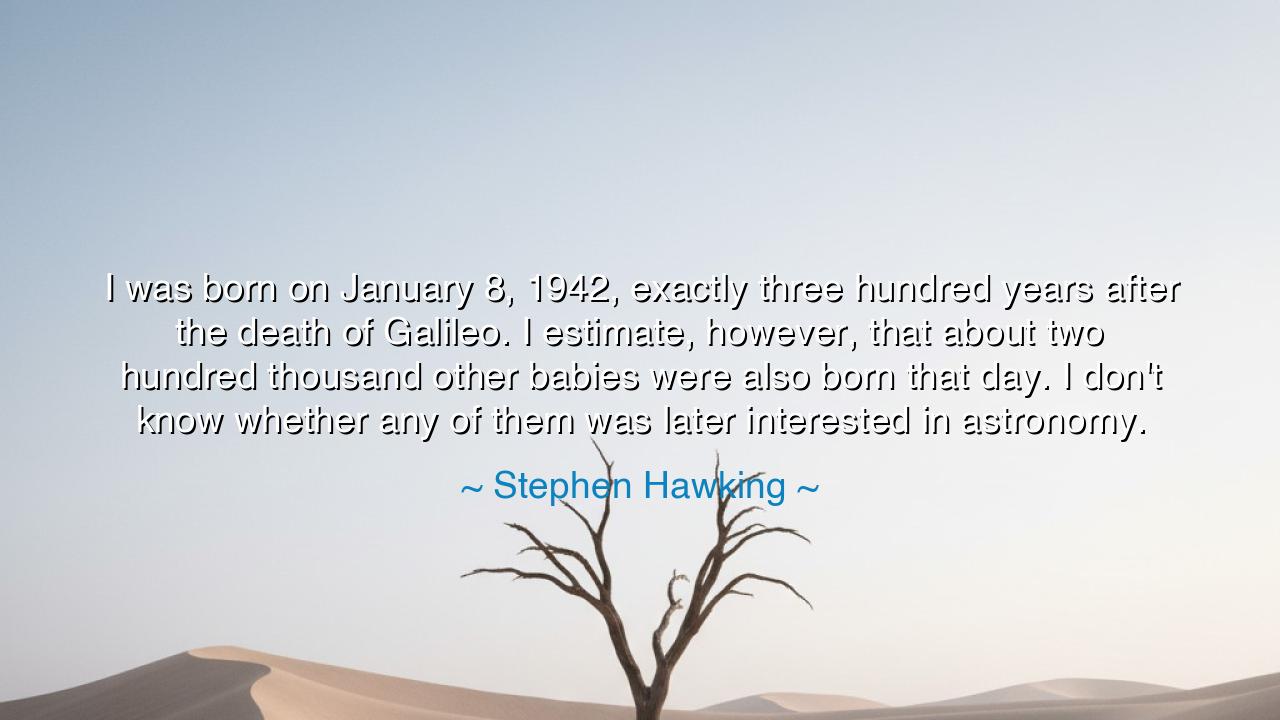
I was born on January 8, 1942, exactly three hundred years after
I was born on January 8, 1942, exactly three hundred years after the death of Galileo. I estimate, however, that about two hundred thousand other babies were also born that day. I don't know whether any of them was later interested in astronomy.






The words of Stephen Hawking, “I was born on January 8, 1942, exactly three hundred years after the death of Galileo. I estimate, however, that about two hundred thousand other babies were also born that day. I don't know whether any of them was later interested in astronomy,” carry a wisdom that blends humility, destiny, and perspective. In this statement, the great physicist reveals not pride in coincidence, but awe at the mysterious patterns of fate and human endeavor. Though the stars may align in symbolic moments, Hawking reminds us that greatness is not written in the heavens alone — it is forged by the mind and will of the seeker.
In the ancient world, many believed that the hour of one’s birth foretold their destiny. Kings consulted the stars, and prophets read omens in the sky. Galileo himself, whom Hawking invokes, shattered that illusion by showing that the heavens were not divine secrets, but realms of law and beauty, governed by forces that could be understood by the human mind. When Hawking notes the coincidence of his birth and Galileo’s death, he acknowledges this symbolic lineage — the passing of the torch from one seeker of the cosmos to another — but he does so with the humility of one who knows that symbols alone do not create greatness. It is not the alignment of stars that defines a thinker, but the courage to question them.
Galileo Galilei, three centuries before Hawking’s birth, stood before the mighty Inquisition and dared to proclaim that the Earth moved around the Sun. His words defied empires but illuminated eternity. For this, he suffered exile and blindness, yet his vision changed the course of humankind. Hawking, born into a different age, carried that same light into the blackness of the cosmos. Confined to a wheelchair, his body weakened by time, yet his mind soared beyond galaxies, unraveling the mysteries of space, time, and the origin of creation. Both men, separated by three hundred years, proved that truth transcends the boundaries of life, body, and age.
Yet Hawking’s remark about the “two hundred thousand other babies” reveals another layer of wisdom — the humility of perspective. It is a quiet reminder that even those born under extraordinary stars are still part of the great human multitude. The universe is vast and impartial; it offers no privilege except the opportunity to think, to wonder, to learn. Among the thousands born on that day, Hawking alone turned his eyes toward infinity and dared to ask: “What is the mind of God?” His greatness was not bestowed by date or destiny, but earned through persistence and imagination.
This is the secret hidden in his words: that true destiny is chosen, not inherited. Each soul is born beneath the same sky, yet few dare to lift their gaze high enough to see its order. The ancients called this the “hero’s path” — not the journey of one blessed by birth, but of one awakened by curiosity. Hawking’s life reminds us that even frailty can become strength when guided by vision, and that wonder itself is a form of courage. The stars may call to all, but only the few who answer that call with discipline and passion will uncover their secrets.
We see this pattern throughout history. Isaac Newton, born into a time of plague and isolation, looked not to the heavens for signs of fate, but to the orchard where an apple fell — and from that simple moment, he glimpsed the universal law of gravitation. Marie Curie, laboring in darkness, found light within the elements themselves. Stephen Hawking, facing the decay of his body, expanded the frontiers of the universe. None were chosen by fate; all were chosen by their devotion to understanding. The lesson is clear: the divine spark is not in one’s birth, but in one’s will to illuminate the unknown.
So, let the wisdom of Hawking guide you: Do not wait for the stars to name you. Instead, name yourself through your work, your thought, and your compassion. Let the vastness of the universe humble you, but not silence you. Stand in awe before creation, yet know that you, too, are part of its unfolding mystery. For every human life holds the potential to expand the cosmos — not by chance, but by choice.
And when you gaze upon the night sky, remember the words of this modern sage: that among the countless souls born beneath the same dawn, it is not the time of one’s birth that matters, but what one dares to dream. The stars will shine regardless — but whether you reach for them, that is the story you must write yourself.






AAdministratorAdministrator
Welcome, honored guests. Please leave a comment, we will respond soon